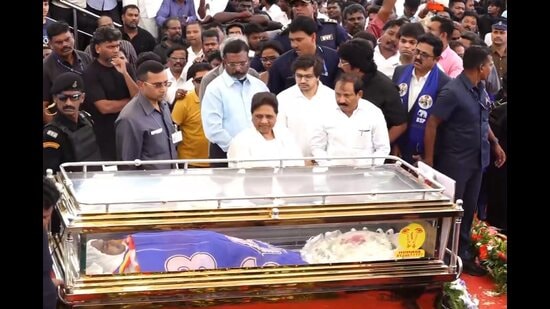Jul 09, 2024 09:15 PM IST
Murder of BSP leader exposes a fault line within the social justice narrative in Tamil Nadu politics
The murder of Bahujan Samaj Party (BSP) Tamil Nadu chief K Armstrong, allegedly the fallout of a gang war, has created ripples in state politics. Most of the men caught on CCTV in the act of murdering the Dalit leader have surrendered to the police. The murder has put the ruling DMK in a spot with its ally, the Viduthalai Chiruthaigal Katchi (VCK), the most influential Dalit outfit in the state, claiming that the real culprits who killed him have not been nabbed. This signals a lack of trust in the state police claim that linked Armstrong, 52, to a criminal gang involved in a multi-crore gold fraud case, and ruled out any political or caste angle in the hacking of the BSP leader. Opposition parties in Tamil Nadu have said the murder of the state head of a national party outside his home in Chennai points to the collapse of law and order.

The truth about the case will have to wait for the police to complete their probe. However, the incident shines light on the ongoing churn in Tamil Nadu’s politics and political economy, where new forms of political assertion are visible. Tamil Nadu’s long tryst with social justice politics successfully marked caste emancipation as central to the democratisation process, but its limitations in transcending, or annihilating caste, are now unravelling. Reservations in employment and education, and a slew of state-sponsored welfare schemes have radically transformed Tamil Nadu’s development indices, but social inclusion and fair access to economic resources remain incomplete goals at the lower rungs of society. Political assertion is often met with violence as the political mainstream negotiates the contradictions in ideology and persisting inequalities at the ground and shuts the doors on new players who want their voices to be heard. The latter are forced to engage with the underbelly of the political economy, which, in turn, casts a shadow on their political ambitions. In rural parts of the state, social and economic assertions by Dalits have been met with violent retaliation, especially from most backward communities. This is the backdrop of the high rate of violence against Dalits in Tamil Nadu.
Though the Dalits account for 21% of Tamil Nadu’s population, their presence in leadership positions in big political parties is minuscule. The VCK, despite the presence of intellectual-politicians such as Thol Thirumavalavan and D Ravikumar, both Lok Sabha MPs, needed to align with the DMK to stay electorally relevant. In recent times, the BJP has been eyeing the Dalit vote, no monolith of course, even though it goes mostly to the Dravidian parties. Armstrong’s murder threatens to burst this bubble, exposing a new fault line in the state.
Unlock a world of Benefits with HT! From insightful newsletters to real-time news alerts and a personalized news feed – it’s all here, just a click away! –Login Now!


